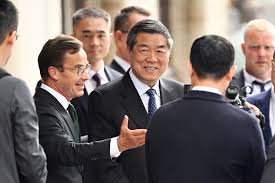STOCKHOLM; Senior U.S. and Chinese officials resumed high-stakes trade talks in Stockholm on Monday, aiming to extend a temporary truce in their ongoing economic conflict, with just weeks remaining before a critical August 12 deadline.
U.S. Treasury Chief Scott Bessent led the American delegation, arriving at Sweden’s Rosenbad government offices, while China’s Vice Premier He Lifeng was also seen at the venue, signaling Beijing’s active engagement in the negotiations. The talks follow preliminary agreements reached in May and June that helped de-escalate a tit-for-tat tariff war and resumed rare earth mineral trade.
Without a fresh agreement, a wave of suspended U.S. tariffs could snap back into effect, potentially pushing trade restrictions between the world’s two largest economies back to near embargo levels, disrupting global supply chains.
Former President Donald Trump, speaking in Scotland alongside British Prime Minister Keir Starmer, noted the ongoing discussions. “We’re dealing with China right now,” Trump remarked, adding that he would welcome broader market access from Beijing.
U.S. Trade Representative Jamieson Greer, present in Stockholm, downplayed expectations for a major breakthrough but emphasized ongoing oversight and coordination to ensure both sides comply with the current deal. He said key goals include ensuring critical minerals continue flowing and laying the groundwork for balanced trade in future agreements.
The Stockholm meeting follows a major U.S.-EU trade pact signed Sunday, in which the U.S. agreed to a 15% tariff deal on EU exports. Analysts believe the U.S. and China are likely to agree to another 90-day extension of their trade truce to enable further negotiations and pave the way for a potential summit between Trump and Chinese President Xi Jinping later this year.
Amid the talks, the Financial Times reported that Washington had paused some tech export restrictions to China, in part to support the diplomatic process and encourage a Trump-Xi meeting in the fall. However, new legislative efforts in the U.S. Congress may complicate progress. Bipartisan bills targeting China’s human rights record, actions in Taiwan, and domestic repression are expected to be introduced this week.
Earlier trade talks in Geneva and London addressed reducing triple-digit tariffs and resuming the flow of goods like rare earth minerals and AI chips, but did not tackle deeper structural disagreements. These include U.S. concerns over China’s state-driven economic model and Beijing’s opposition to U.S. national security restrictions on technology exports.
Scott Kennedy of the Center for Strategic and International Studies described the prior talks as preliminary steps: “They were trying to rebuild the relationship enough to have real discussions about the fundamental issues dividing the two sides.”
Bessent has indicated a willingness to extend the truce but stressed the U.S. remains focused on long-term goals, including encouraging China to shift its economy toward domestic consumption. With China’s control over critical minerals giving it leverage, analysts say resolving the U.S.-China trade tensions will require far more time and diplomacy than other regional negotiations.


















